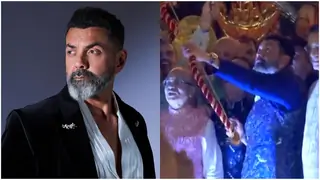'Bollywood is still in the Stone Age'
Top Indian film actor Naseeruddin Shah says Indian filmmaking is still in the Stone Age compared to elsewhere. Characteristically outspoken, he didn't mince words when he spoke at the ongoing DIFF about religion, cinema and social responsibility of films. Excerpts from a press conference on the global premier of his movie Shoot On Sight.
How does Indian cinema fare vis--vis international cinema?
I think we (Indian cinema) are in the Stone Age as far as filmmaking is concerned. You see films from Iran, Poland, Czech Republic, Argentina, Chile, Thailand, Korea and you get completely blown away from the kind of subject they are tackling and the manner in which they are doing it. The evolution of filmmakers is evident there. In India what do we have? Boy meets girl. People do not think beyond that.
Our so-called serious filmmakers make films about the oppression of women and that of landless labourers. There doesn't seem to be a third topic in the country seemingly worthy of making a film about. It is amazing how our filmmakers don't look at the life around them.
Satyajit Ray said in his book that the country (India) which has inspired artists from various mediums from all over the world seems to be completely incapable of inspiring the filmmakers. We are very much behind although the world is watching Bollywood films today.
What was it like to do movies about Islamic extremism such as Khuda Ke Liye and Shoot On Sight?
Khuda Ke Liye had the same theme as Shoot On Sight. It is high time that the voice of a moderate, enlightened, educated Muslim is raised. We have kept quiet long enough and let the fundamentalists be our spokesmen. It is time for that to end. I accepted these films because I feel they are extremely important films. And even more so for being a Muslim and having been brought up in an orthodox Muslim household.
What's message do these films convey?
Both films state the fact that no religion, as devised by its originator, propagates hatred. There is no religion that propagates bloodshed, advocates the killing of the innocent, and yet all this is being done in the name of religions around the world. Muslims are getting the raw deal as far as the perception of justice is concerned. The films convey that it is not the religion that is false or faulty; it is people who thrive on religion who are at fault. There is really no difference between what one religion says and what another says.
Do these films reach far in terms of visibility?
I have always felt movies like these need to be made even if at the moment they don't have an audience. If for nothing else, for posterity. The serious function that the cinema serves is to act as a record of its time.
You really think that movies have the power to change the social conscience?
I believe movies have the power that no other art form has. That is to capture life exactly as it is. To me that is a significant function of serious cinema. I think documentaries perhaps can make a person examine his values and perspective of life, but there is a question mark in my mind regarding feature films being able to do that.
I am not at all certain if feature films can be a medium of education or claim to be art, but where they do score is that no other art form has the ability to capture life as it exists. It is, however, too much to expect that a film will have a sweeping effect all over the society. Even if it can affect a single person that would mean its purpose is achieved.
Shoot On Sight
Against a background of terrorist bombings in London, a dutiful, long-serving Scotland Yard Commander, Lahore-born Tariq Ali (Naseeruddin Shah), finds himself manipulated into leading an investigation into the police shooting of a young Muslim man – suspected of being a terrorist – as he boarded a London underground train.
A devout Muslim in a happy mixed marriage to an Englishwoman, with two children, Tariq finds himself caught between worlds – sympathetic to the victim's family, and attacked as a collaborator at his mosque by a radical cleric (Om Puri). Increasingly conscience stricken, he is driven to make a hard choice between faith and duty.




































6